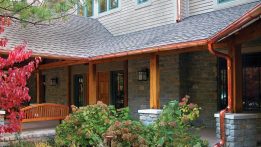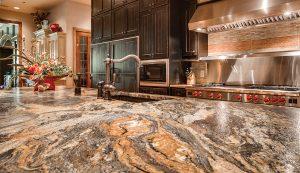 When redoing a kitchen or bathroom, the main focal point is often the countertop. The choice of countertop can cohesively tie together the design of a room and enhance a space’s function depending on its appearance and the desired level of strength and maintenance. Here are some of the best countertop options based on style, strength, maintenance, and expense.
When redoing a kitchen or bathroom, the main focal point is often the countertop. The choice of countertop can cohesively tie together the design of a room and enhance a space’s function depending on its appearance and the desired level of strength and maintenance. Here are some of the best countertop options based on style, strength, maintenance, and expense.
Granite
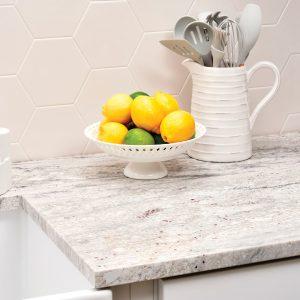 Complete with a chic, luxurious finish, granite has been a top choice for countertops over the last few years due to its longevity and increased resale value. While common in many homes, granite’s variation in color and design gives each slab a unique look. As one of the more durable natural stones, its heat and scratch resistant surface adds to its appeal. Depending on its individual density and absorption rate, granite may require sealing to avoid staining. Generally, you will need to reseal granite countertops every few years. To test if granite requires resealing, pour a small amount of water onto its surface. If the water absorbs into the stone rather than beading upon its surface, it needs to be resealed. It is not recommended to install granite as a DIY project since it needs to be properly installed to avoid cracks. Overall, granite remains a popular countertop choice despite being on the higher end of the price range.
Complete with a chic, luxurious finish, granite has been a top choice for countertops over the last few years due to its longevity and increased resale value. While common in many homes, granite’s variation in color and design gives each slab a unique look. As one of the more durable natural stones, its heat and scratch resistant surface adds to its appeal. Depending on its individual density and absorption rate, granite may require sealing to avoid staining. Generally, you will need to reseal granite countertops every few years. To test if granite requires resealing, pour a small amount of water onto its surface. If the water absorbs into the stone rather than beading upon its surface, it needs to be resealed. It is not recommended to install granite as a DIY project since it needs to be properly installed to avoid cracks. Overall, granite remains a popular countertop choice despite being on the higher end of the price range.
Marble
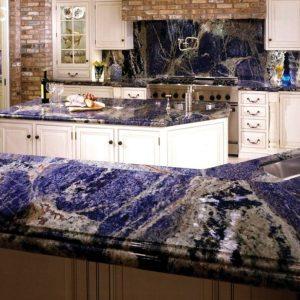 Marble is natural stone with a lavish and elegant appearance. Because no two sheets of marble are exactly the same, your kitchen will have its own distinct appearance. However, the stone comes with a substantial price tag. Compared to granite and quartz, marble is a much weaker and more porous stone, making it more susceptible to scratch marks and stains. It is recommended marble be resealed once or twice a year to maintain its appearance. While the stone’s expense may limit its prevalence, it is still highly sought and adds a sense of luxury to a space.
Marble is natural stone with a lavish and elegant appearance. Because no two sheets of marble are exactly the same, your kitchen will have its own distinct appearance. However, the stone comes with a substantial price tag. Compared to granite and quartz, marble is a much weaker and more porous stone, making it more susceptible to scratch marks and stains. It is recommended marble be resealed once or twice a year to maintain its appearance. While the stone’s expense may limit its prevalence, it is still highly sought and adds a sense of luxury to a space.
Quartz
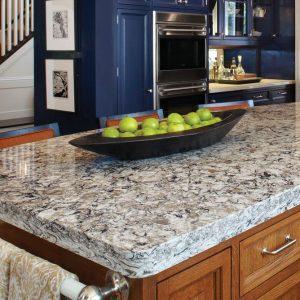 Coming in a variety of colors and patterns, quartz is known as an alternative to granite and marble. As an engineered stone, it is made from quartz particles mixed with resin and polymers. It is made to be low-maintenance and can replicate the appearance of granite or marble. The product’s heavy durability and nonporous surface makes it an attractive substitute for the pricier natural stones. Although quartz can be heat sensitive, the combination of natural stone and synthetic resins allows the material to be more resistant to scratches and impact than natural stone. It requires no annual sealing or polishing. If you’re looking for a durable material at a lower price point, this engineered stone competes with granite as the most popular countertop.
Coming in a variety of colors and patterns, quartz is known as an alternative to granite and marble. As an engineered stone, it is made from quartz particles mixed with resin and polymers. It is made to be low-maintenance and can replicate the appearance of granite or marble. The product’s heavy durability and nonporous surface makes it an attractive substitute for the pricier natural stones. Although quartz can be heat sensitive, the combination of natural stone and synthetic resins allows the material to be more resistant to scratches and impact than natural stone. It requires no annual sealing or polishing. If you’re looking for a durable material at a lower price point, this engineered stone competes with granite as the most popular countertop.
Concrete
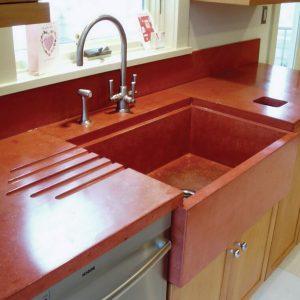 Unlike the concrete used for sidewalks, concrete countertops have a smooth, polished finish that comes in many textures and tints. With their sleek, modern finish, concrete countertops are perfect for homes seeking an industrial flare. The material is very durable and scratch resistant; however, it does tend to stain easily. Also, because the concrete is often cast to fit your individual counter, it can be expensive.
Unlike the concrete used for sidewalks, concrete countertops have a smooth, polished finish that comes in many textures and tints. With their sleek, modern finish, concrete countertops are perfect for homes seeking an industrial flare. The material is very durable and scratch resistant; however, it does tend to stain easily. Also, because the concrete is often cast to fit your individual counter, it can be expensive.
Ceramic Tile
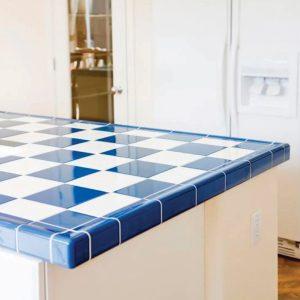 Ceramic tile is an affordable and durable countertop material. It is easy to clean, resistant to heat, and can be installed with basic do-it-yourself skills. While the material does not possess the same high status as marble or granite, it can be customized to resemble natural stone. The tile is easy to wipe clean. However, the grout will need occasional sealing to protect against stains and mildew. If there are chips or cracks in the grout, it will need to be re-grouted and sealed. Ceramic tile is an inexpensive option that can be customized to suit many kitchen and bathroom designs.
Ceramic tile is an affordable and durable countertop material. It is easy to clean, resistant to heat, and can be installed with basic do-it-yourself skills. While the material does not possess the same high status as marble or granite, it can be customized to resemble natural stone. The tile is easy to wipe clean. However, the grout will need occasional sealing to protect against stains and mildew. If there are chips or cracks in the grout, it will need to be re-grouted and sealed. Ceramic tile is an inexpensive option that can be customized to suit many kitchen and bathroom designs.
Laminate
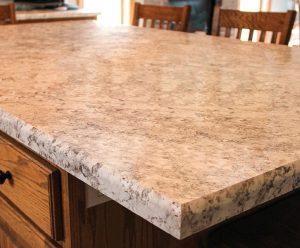 Laminate countertops come in a variety of colors and styles. While laminate may not achieve the same luxury status as natural stone, it has surged in popularity due to its flexibility in design. Made from plastic-coated synthetics and bound to a particleboard core, its smooth finish allows for easy cleanup. Its maintenance, installation, and price make laminate the optimal option for those upholding a small budget. Unfortunately, the surface is not super durable and is prone to chips and scratches.
Laminate countertops come in a variety of colors and styles. While laminate may not achieve the same luxury status as natural stone, it has surged in popularity due to its flexibility in design. Made from plastic-coated synthetics and bound to a particleboard core, its smooth finish allows for easy cleanup. Its maintenance, installation, and price make laminate the optimal option for those upholding a small budget. Unfortunately, the surface is not super durable and is prone to chips and scratches.
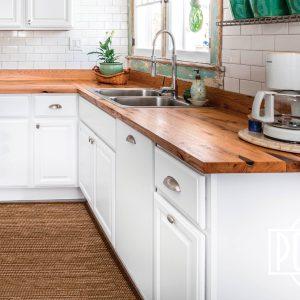 When choosing your countertop material, keep in mind the use of the space. While appearance is important, a material’s durability and expense should play a role in your choice of countertop. In heavy-use kitchens or bathrooms, a harder, more durable stone may be the better option. If you’re looking for a luxury finish without the price, quartz and concrete countertops are often cheaper than natural stone. When abiding by a tight budget, laminate and ceramic tiles suit many spaces without sacrificing style. In the end, it’s up to you to choose the best countertop option for your specific style and scenario.
When choosing your countertop material, keep in mind the use of the space. While appearance is important, a material’s durability and expense should play a role in your choice of countertop. In heavy-use kitchens or bathrooms, a harder, more durable stone may be the better option. If you’re looking for a luxury finish without the price, quartz and concrete countertops are often cheaper than natural stone. When abiding by a tight budget, laminate and ceramic tiles suit many spaces without sacrificing style. In the end, it’s up to you to choose the best countertop option for your specific style and scenario. ![]()
Kate Bernicke
Home & Yard Magazine


